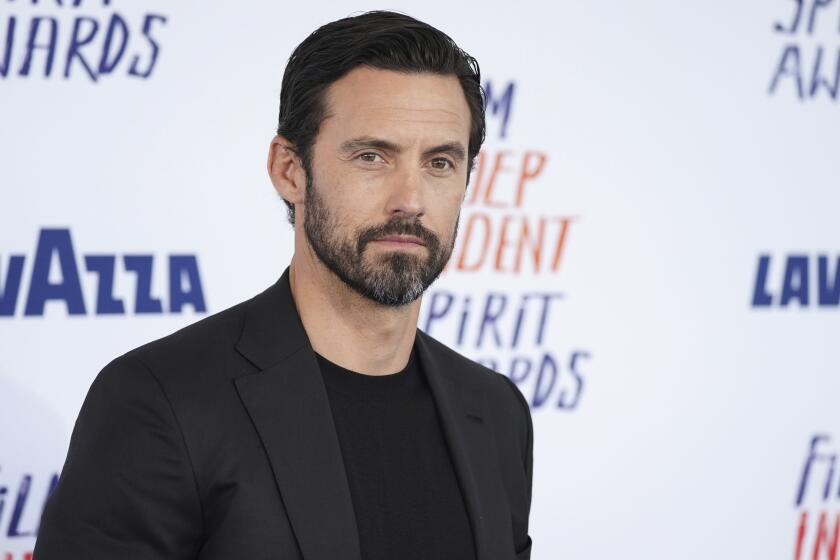Beacon’s Aglow With Commercial Hit
- Share via
The current summer hit “Air Force One” set some box office records and helped boost overall ticket sales in August to a new high.
Its success could also help elevate the company behind the movie, Beacon Communications, to the Hollywood big leagues after surviving years in the independent trenches self-financing and producing smaller, more esoteric films like “The Commitments,” “Princess Caraboo,” “Sugar Hill” and the antiwar drama “A Midnight Clear.”
Owned by the publicly traded Denver-based Ascent Entertainment Group, Beacon is among the few autonomous outfits associated with the major studios that pays for its own development and overhead, brings a lot of production money to the table and retains the lucrative international rights and copyrights to its films.
The 7-year-old company is positioned to make its first financial killing with “Air Force One,” controlling three-quarters of the worldwide rights to the Harrison Ford action-thriller that has already grossed more than $130 million at the U.S. box office.
*
Tucked away in the dreary, two-floor walk-up suite of offices at Warner Hollywood Studios once occupied by legendary movie mogul Samuel Goldwyn, Beacon Chairman Armyan Bernstein and President Marc Abraham are trying hard to remain humble about their first commercial hit.
While still committed to specialized films and moderate-budget fare like the upcoming Walt Disney Co. releases “A Thousand Acres,” a $28-million family saga starring Jessica Lange and Michelle Pfeiffer, and “Playing God,” a $15-million crime drama featuring “X-Files” star David Duchovny, Bernstein is hopeful he and Abraham can now also “bet on our instincts” when it comes to making more commercial hits like “Air Force One.”
A former screenwriter-director and well-connected Hollywood insider who says Kevin Costner is his “best friend,” Bernstein recalls his reaction the Sunday morning he learned “Air Force One” was headed for a record weekend opening of more than $37 million.
“I went into the backyard and sat on the steps, and I felt fabulous. It felt really good to have a big hit. Then I felt a little bad that it felt so good,” says Bernstein, who wrote “One From the Heart,” directed by Francis Ford Coppola, and the ‘70s disco film “Thank God It’s Friday,” and also directed two small films.
Abraham--a former sportswriter and TV series writer (“Moonlighting,” “21 Jump Street”) who’s admittedly more comfortable in the editing room or on a movie set than lunching at the Grill--says he now has the personal confidence of knowing that Beacon can produce a big hit.
“It’s easy to say, ‘I know I’m a great batter, and I can hit a home run. I’m not just a singles hitter.’ But until you actually hit one, you don’t really know you can,” concedes Abraham, the author of two books on the Olympics and whose entry into film was with a documentary on the Cuban athletic system.
Both Abraham, 48, a born-and-bred Southerner from Kentucky, and Bernstein, a Chicago native who turned 50 last week, have kicked around too long to think success comes easy.
“We know how many things had to go right for this movie to be a success,” says Abraham in his Southern drawl, “from the script to the casting to the director to the release date.”
A few years ago, screenwriter Andrew Marlowe pitched a story to Beacon’s newly hired development executive, indie producer Jonathan Shestack (“The Last Seduction”), about terrorists who take over the president’s plane. Beacon immediately commissioned the script.
Bernstein offered Costner the lead role, but when the star said he wanted a year off, he phoned Harrison Ford’s longtime agent, Pat McQueeney, and pitched her the project.
“Army [Bernstein] is so damn charming, I very reluctantly agreed to read the script,” McQueeney says. “But I told him that I didn’t want to waste his time since Harrison wouldn’t be available for two years.”
However, after reading the material and thinking “it was the best action script I ever read,” McQueeney asked Disney to push back the start date of “6 Days, 7 Nights” so Ford could do “Air Force One” first. The studio agreed to do it.
Ford, currently on location in Hawaii shooting “6 Days,” says he found working with Bernstein and Abraham “a really satisfying experience from the early stages of strengthening the screenplay, finding a director [Wolfgang Petersen] . . . and being cooperative and appropriate during production.”
*
At a cost of $90 million, “Air Force One” was by far Beacon’s most ambitious project and the first to be put into development after being acquired in 1994 by the Bethesda, Md.-based telecommunications company Comsat Corp. (In late 1995, Comsat spun off 20% of its entertainment businesses, which included Beacon, to the public as Ascent Entertainment Group, and two months ago sold its remaining 80% share to the street and the public. Ascent also owns the National Basketball Assn.’s Denver Nuggets, the National Hockey League’s Colorado Avalanche and On-Command, the largest supplier of movies to the hotel and lodging business.
Beacon made a smart deal on “Air Force One,” particularly by insisting on retaining ownership of the foreign rights, which are licensed to Disney for a 20% distribution fee. After Disney collects its fee and recoups the $45-million production money and additional print and ad advance it put up, Beacon will see all overseas revenue. Beacon invested about $40 million of its own money in the film, splitting costs and sharing U.S. profits with Sony Pictures.
Beacon has historically “bridge financed” its films, meaning the bulk of production funds come from advances it receives from a domestic distributor and from foreign presales.
“With bridge financing, we always felt if you take a loss you can sustain it as opposed to it killing you,” says Bernstein. “The lifeblood of the independents is foreign. You have to own and control foreign.”
Beacon currently has a five-year, 20-picture deal with Universal Pictures whereby it owns all international rights to its films and partners with the studio domestically. While no projects have yet materialized under the year-old pact, Beacon plans to make four or five movies a year--a mix of bigger star-driven films and smaller, more artistic titles that can be released through Universal’s new ownership in the specialty movie outfit October Films.
Bernstein winces at the suggestion that in its first few weeks of release, “Air Force One” has far outgrossed the combined box-office performances of all Beacon’s previous movies.
He and Abraham make no apologies for those films despite their lack of commercialism. “We set out to make movies we like and want to take chances on, and I’m proud of those movies,” says Abraham.
Bernstein adds that he’s “really proud that as an independently financed company we survived to tell the story. Beacon has made money on every film except ‘The Road to Wellville’--that’s not bad.” While the Alan Parker movie lost several million, the director’s earlier debut film for Beacon, “The Commitments,” a hip look inside Dublin’s rock scene, was the company’s most profitable, in large part due to great soundtrack sales.
When Comsat acquired Beacon in 1994 for $29 million in cash and debt, the company assumed liabilities for two films made under Beacon’s previous deal with Sony: “Wellville,” which cost $25 million, and “The Baby-Sitter’s Club,” also a box-office dud.
Charlie Lyons, president and chief executive of Beacon’s parent, Ascent, says that while those films were “financially disappointing,” he was impressed that Beacon was “a lot less exposed on those projects than they could have been.” Besides, “ ‘Air Force One’ will more than make up for a lot of ‘Wellvilles,’ ” he proudly points out.
Bernstein and Abraham formed Beacon in 1990 with financial backing from Chicago real estate developer Tom Rosenberg, a college pal of Bernstein’s from the University of Wisconsin. After years of financing modest-budget films, they decided to seek a corporate partner to help expand their business and mix up their portfolio with some bigger movies.
And, despite the current windfall of “Air Force One,” Bernstein and Abraham say they remain mindful of the ups and downs of the movie business.
“It’s a tough business. It’s like launching a new soft drink every time. You’ve got to get the American public to say ‘not Coca-Cola, Splice,’ ” Bernstein says. “And I want to do what we’ve always done. I want Marc to walk into my office and say, ‘There’s a great writer in the next room and he’s got a great story.’ I want to respond to material, not ‘Yeah, America will line up there.’ ”
More to Read
The biggest entertainment stories
Get our big stories about Hollywood, film, television, music, arts, culture and more right in your inbox as soon as they publish.
You may occasionally receive promotional content from the Los Angeles Times.










